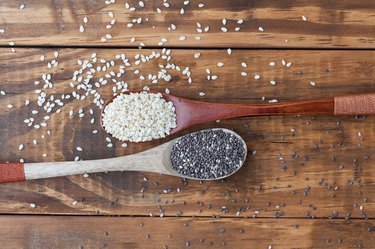
When it comes to a pregnancy diet, it's natural to be concerned about foods to avoid when pregnant. After all, common foods like sushi can pose a danger to yourself or your growing baby. But then, there are also "helpers," such as sesame seeds, which can fill dietary gaps with much-needed nutrients.
Tip
Although any food can be problematic if you over-indulge, sesame seeds are not considered one of the foods to avoid when pregnant. In fact, these nutritious seeds contain many of the nutrients your body needs during this crucial time.
Video of the Day
An “Open Sesame” Seeds Pregnancy?
Various seeds and nuts, in general, offer a wealth of nutrients that pregnant people need. They also work well in both cooked and uncooked dishes. Consider adding more nutrient-rich ingredients, like sesame seeds, to foods throughout the course of the day. Between sesame muffins in the morning, a healthy protein bar containing the seeds, and sesame-crusted scallops at night, it's easy to consume about an ounce of these nutrient-packed seeds each day.
Video of the Day
The American Pregnancy Association (APA) recommends that you take in at least 75 grams of protein each day during pregnancy. This macronutrient encourages healthy fetal tissue growth, as well as supporting changes in your uterus and breasts. According to the USDA, sesame seeds provide 5 grams of protein per 1 ounce serving, or 6.5 percent of the recommended daily protein dose for pregnant people.
While the serving isn't enough to act as the main protein component for most meals, it can boost your overall protein intake when added to main meals or snacks. This is helpful because foods to avoid when pregnant, like certain fish or egg dishes, may once have been your go-to source for protein.
Read more: What Foods Combine to Make a Complete Protein?
Seeding a Healthy Pregnancy
Cleveland Clinic recommends sesame seeds as a rich source of calcium. As the USDA notes, a 1 ounce portion provides 276 milligrams of the mineral. That's more than a quarter of the daily calcium intake recommended by the APA. Calcium is a crucial building block for your baby's teeth and bones. It also helps prevent the excess swelling that can occur in some pregnancies.
The iron content of sesame seeds is yet another element that makes them a useful part of the pregnancy diet. A 1-ounce portion of sesame seeds contains 4 milligrams of iron, which represents about 15 percent of the 27 milligrams the APA recommends pregnant people consume daily. Iron keeps you from getting run down and developing conditions such as anemia, as your growing baby places a higher demand on red blood cell production.
Your doctor likely prescribed folic acid supplements to help prevent birth defects such as spina bifida. While sesame seeds for pregnancy won't supplant your need for these supplements, they can supplement the supplement, so to speak. A 1-ounce serving contains 27.5 micrograms, or about 4.5 percent of the 600 microgram daily minimum suggested by the APA.
Warning
Consuming high-fat snacks in large quantities is never a good idea, even if their composition is mostly “good fats.” Although you’d be unlikely to dump 1 cup of sesame seeds over your morning cereal, it’s worth noting that doing so would be overdoing both your saturated fat and healthy fat intake for the day.
Need More Incentive?
The American College of Obstetricians and Gynecologists notes that healthy fats are a crucial part of the pregnancy diet. These come from plant-based foods, as opposed to the saturated kind from animal sources. Of the 14 grams of total fat per 1 ounce of sesame seeds, only 2 grams come from saturated fat, according to USDA figures. The remaining are mostly omega 6 and omega 3 fatty acids. These healthy fats help build up the placenta, boost your energy and support fetal organ development.
Read more: The Health Benefits of Black Sesame Seeds
It's not unusual to get leg cramps as you progress into your pregnancy. These are not only painful, but can interfere with much-needed sleep. The Mayo Clinic recommends extra magnesium as a preventative method for reducing the number of these nighttime "attacks."
Stretching, staying hydrated and taking in more calcium — which sesame seeds also provide — can also help. A 1-ounce serving of sesame seeds contains almost 100 milligrams of magnesium, or almost one-third of the magnesium recommended daily for pregnant people.
- American Pregnancy Association: "Foods to Avoid During Pregnancy"
- American Pregnancy Association: "Pregnancy Nutrition"
- USDA: "Nutrition Facts for Sesame Seeds"
- FDA: "Eating Out & Bringing In from Food Safety for Moms to Be"
- Cleveland Clinic: "Pregnancy Nutrition"
- International Journal of Research and Development in Pharmacy and Life Sciences: "Sesamum Indicum Before and During Pregnancy"
- American College of Obstetricians and Gynecologists: "Nutrition During Pregnancy"
- Mayo Clinic: "What Causes Leg Cramps During Pregnancy?"